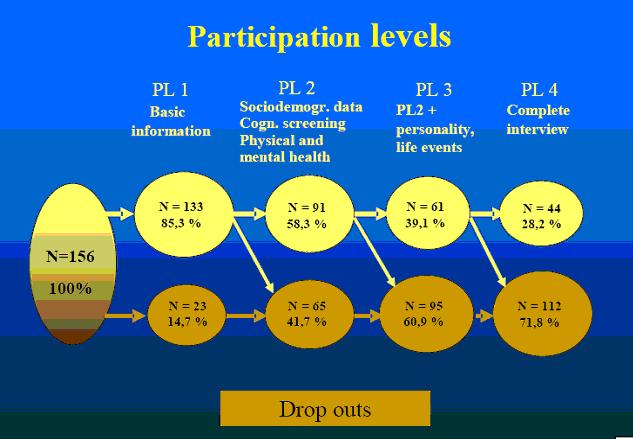HD 100 - Heidelberg Centenarian Study
Primary Investigators: Dr. Christoph Rott
Project Group: Dr. Daniela Jopp, Dipl.-Psych., Dipl.-Gerontol. Vera d’Heureuse (until 06/2004), Dr. Gabriele Becker (until 10/2003), Dipl.-Gerontol. Petra Schönemann-Gick (until 12/2001), Dagmara Wozniak (02/2004-06/2005)
Project Description
Background and Research Objectives
Methods
Sample
Results
Publications
Presentations
Contact
Research on centenarians is focusing on the most rapidly growing age group of the older population. Centenarians have grown by a factor of 22 from 1950 to 1990 in industrialized countries. Meanwhile, a substantial number of centenarian studies has been conducted all over the world with a focus on genetic, physiologic, and medical issues. However, few data about the psychosocial situation of this age group are available, especially in Germany. Results from representative samples of extremely old individuals are particularly important to determine the requirements for an adequate social and economical support, at present and in the future.
The Heidelberg Centenarian Study assesses objective and subjective quality of life and their interrelations in five domains:
- Cognitive status
- Functional health
- Mental health
- Subjective well-being
- Use of support and care.
From a lifespan perspective, the following specific research questions are addressed:
- What is the cognitive, functional, and mental status of German centenarians and how pronounced is the variability in these areas?
- How do centenarians evaluate their present situation (e.g. subjective health, subjective well-being)?
- Which patterns of autonomy vs. dependency can be found and which factors are responsible for autonomy or dependency?
- Which contribution do internal (e.g., personality) and external (family, professional service providers) resources make in order to explain interindividual differences in subjective well-being?
- Are there longitudinal changes (e.g. health, cognition, well-being) within an 18-months period? Which attributes relate to survival?
The Heidelberg Centenarian Study is population-based, i.e., all centenarians of a given geographical area were contacted (see the red area on the map). 172 cities and communities were contacted and asked for names and addresses of persons born in 1901 or earlier.

475 persons were nominated by the cities and communities. 281 persons were eligible. 125 persons (44.5 percent) could not be verified (they died in the interim or their data did not correspond to the information provided by the registries (e.g., some were younger than stated)). A direct contact was established with 156 persons or relatives. Of this group, 65 individuals or their relatives refused participation because of obvious dementia, severe health problems, psychiatric disorders, or lack of interest or because they considered the interview to be too stressful. Ninety one centenarians agreed to participate (face-to-face interview; see Participation levels 2).

Data are obtained from the centenarians, a proxy, and a trained interviewer. After 18 months, a subgroup of individuals was again assessed with a subset of the T1 measures. Moreover, participants are followed by contacting their proxies every 6 months till they die. The data collection effort allows a comparison between the Heidelberg Centenarian Study and the Georgia Centenarian Study.
Most of the 91 participants (face-to-face interview) were women (85 percent), very frequently widowed (78 percent), and about 3 of 4 had received an elementary school education. Nearly half of them lived in institutions (e.g., a nursing home) and 20 percent with relatives.
• Dementia in centenarians is not a necessity: The results of the modified version of the Mini-Mental State Examination reveal two extreme groups. There are centenarians who did not show any signs of cognitive impairment, but also centenarians with extreme impairment. The prevalence of dementia in this study is 52 percent. The data underline the assumption that the variability of the cognitive status in the oldest old is still very high.
• Functional limitations are a widespread phenomenon in centenarians. At least 83 percent have to be considered as depending on nursing care.
• The German Long-term Care Insurance considers only functional impairments as a cause of providing professional care, not cognitive impairment. If the combination of functional and cognitive impairment ("functional competence") is taken into account at least 20 percent of the centenarians would receive more support as covered by the official system.
• The maintenance of autonomy and independence of the oldest old population is at high risk especially due to the coexistence of functional and cognitive impairments. The gap between the nursing care granted by the official system and the actually needed support lead to a substantial involvement by the relatives.
• Centenarians overestimate their functional health when compared to the evaluation that informants provide. But, self-rated health and proxy-rated health are based on different sources: Informants mainly rely on ADL capacity whereas for centenarians mental health and not physical health is a crucial issue.
• The physical and cognitive functions of centenarians show a continuous decline with increasing age (Individual Growth Curve Modelling). Additionally, a significantly accelerated decrease in cognitive functioning was found in the close proximity to death (0.5 years before death) which is in line with the hypothesis of a terminal-decline (e.g., Berg, 1996). A significant drop in physical functioning began much earlier, namely 1.75 years before death (Rott & Wozniak, 2006; Wozniak, 2005). However, there was also a significant interindividual variability in cognitive and physical development indicating that both biological as well as person-specific factors influence cognitive and functional status at the end of life.
• In spite of substantial cognitive and functional limitations centenarians reveal a high amount of well-being, especially with respect to a positive valuation of their lives.
• Recent analyses show that centenarians are as happy as middle-aged and older adults of the Interdisciplinary Longitudinal Study of Adult Development (ILSE) (Jopp & Rott, 2004, 2006).
• Moreover, personal resources such as health, social network and the personality trait extraversion were found to have a direct impact on interindividual differences in happiness. However, when including self-referent beliefs such as self-efficacy or will to live in the analysis, these factors served as mediators: The impact of the resources was mostly mediated by beliefs. The results demonstrate that protective mechanisms are still effectively at work in centenarians. Additionally, there was no indication that psychological resilience reaches its limits in this extremely old age or that phenomenon such as psychological mortality may become more frequent in centenarians (Jopp & Rott, 2004, 2006).
Jopp, D., & Rott, C. (2006). Adapting to very old age: Exploring the role of personal resources and
Rott, C., & Jopp, D. (2006). Subjective well-being in centenarians. Global Ageing, 4(special issue:
Rott, C., Jopp, D., d’Heureuse, V., & Becker, G. (2006). Predictors of well-being in very old age. In H.-W.
Wozniak, D. (2005). Entwicklungsverläufe von körperlichen und kognitiven Funktionen am Lebensende:
Jopp, D., & Rott, C. (2004). Glücklichsein mit 100: Zur Rolle von Ressourcen, Überzeugungen und
Kliegel., M., Moor, C., & Rott, C. (2004). Cognitive status and development in the very oldest old: A
Kliegel, M., Zimprich, D., & Rott, C. (2004). Life-long intellectual activities mediate the predictive effect of
Becker, G., Rott, C., d’Heureuse, V., Kliegel, M., & Schönemann-Gieck (2003). Funktionale Kompetenz
Schönemann-Gieck, P., Rott, C., Martin, M., d’Heureuse, V., Kliegel, M., & Becker, G. (2003).
Kliegel, M., Rott, C., d’Heureuse, V., Becker, G., & Schönemann, P. (2001). Demenz im höchsten Alter ist
Rott, C., d’Heureuse, V., Kliegel, M., Schönemann, P., & Becker, G. (2001). Die Heidelberger
Rott, C., d’Heureuse, V., Schönemann, P., Kliegel, M., & Martin, P. (2001). Heidelberger
Rott, C., & Jopp, D. (2007, September). Körperlich gebrechlich, aber psychisch resilient. Prädiktoren der
Rott, C., & Jopp, D. (2007, September). Körperlich gebrechlich, aber psychisch resilient. Prädiktoren der
Jopp, D., & Rott, C. (2006, November). Meaning in life and will to live: Assurance for positive adaptation
Jäger, T., Kliegel, M., Rott, C., & Wozniak, D. (2006, July). Cognitive development at the frontier of
Rott, C., & Wozniak, D. (2006, May). Physical and cognitive functioning at the frontier of the human life
Rott, C., Wozniak, D., & Kliegel, M. (2006, April). Age-related vs. death-related trajectories of cognitive
Jopp, D., & Rott, C. (2006, February). Adapting to resource constraints in extremely old age. Paper
Rott, C., & Wozniak, D. (2005, November). Age-related vs. death-related trajectories of physical health in
Jopp, D., & Rott, C. (2005, June). Personal resources, meaning in live, and will to live: Predictors of
Jopp, D., & Rott, C. (2004, November). On the impact of resources and self-referent beliefs on successful
Jopp, D., & Rott, C. (2004, October). Glücklich mit 100? – Zur Bedeutung von Ressourcen, Überzeugungen
Jopp, D., Rott, C., & d’Heureuse, V. (2004, August). On the roles of resources, self-referent beliefs, and
Rott, C., Jopp, D., d’Heureuse, V., & Becker, G. (2004, June). Predictors of well-being in very old age.
Rott, C., & d’Heureuse V. (2003, September). Zur Variabilität von Entwicklungsverläufen im extrem hohen
Rott, C., d’Heureuse, V., Becker, G., & Kliegel, M. (2003, April). The Heidelberg Centenarian Study: A
Rott, C., Becker, G., d’Heureuse, V., & Kliegel, M. (2002, November). Maintaining mental health under
Rott, C., d’Heureuse, V., Becker, G., & Kliegel, M. (2002, November). The Heidelberg Centenarian Study:
Contact


